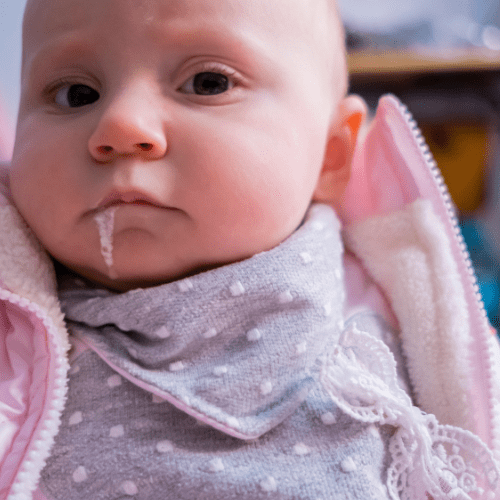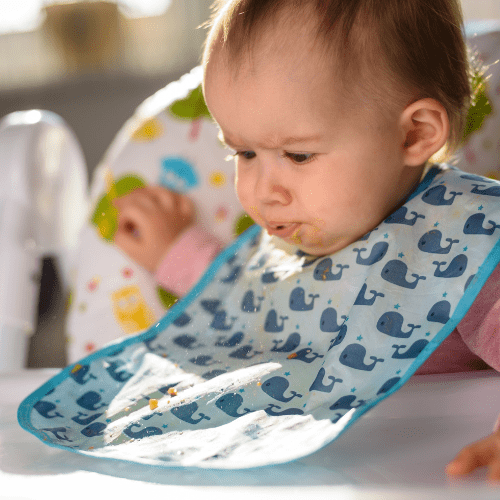There are some issues with newborn care: no parenting classes can prepare you for washing your first diaper blowout, pulling snot from blocked infant nostrils, and the sheer quantity of baby spit up you’ll encounter.
Spit-up happens to half of all newborns. While seeing your infant spitting up may be alarming — you’re undoubtedly concerned if she’s swallowing enough breast milk or formula in her stomach spit-up is natural and acceptable.
This is a guide to understanding baby spit-up and when and if you should visit your doctor if you’re worried about how much your child spits up.


There are some issues with newborn care: no parenting classes can prepare you for washing your first diaper blowout, pulling snot from blocked infant nostrils, and the sheer quantity of baby spit up you’ll encounter.
Spit-up happens to half of all newborns. While seeing your infant spitting up may be alarming — you’re undoubtedly concerned if she’s swallowing enough breast milk or formula in her stomach
spit-up is natural and acceptable.
This is a guide to understanding baby spit-up and when and if you should visit your doctor if you’re worried about how much your child spits up.
Table of Contents
Why Do Infants Spit Up
Spit up, or the trickle of stomach components that might emerge after feeding is unsightly, inconvenient… and entirely typical.
The baby’s digestive system is still developing, and her disrupted esophageal sphincter a ring of muscle that keeps food in the belly isn’t fully functional for several months. This makes it very easy for any food she’s just eaten to re-enter her stomach. Spit-up can also be caused by your infant’s belly being exceptionally complete after feeding or changing her position quickly after eating, such as formula.
She may also spit when your baby burps, drools, coughs or cries. Because your baby is exclusively fed on milk or formula (you realize, bust milk or formula), it’s effortless for the contents of her stomach to return.
Your baby’s formula may be causing excessive spit-up in rare cases. According to the American Academy of Pediatrics (AAP), 5 percent of kids have milk-soy protein intolerance, indicating that they cannot break down the proteins found in milk or soy products. (Spitting up is just one of a collection of symptoms that might signal this condition.) If your baby is diagnosed with spitting up, her doctor may advise you to try a hydrolyzed formula.
Causes for Baby Spit Up
Although it is natural for a baby to spit up, there are a few reasons why she might be doing so.
Spit-up
Spitting up, on the other hand, is generally a lot more like what your baby would be eating if you’re exclusively nursing (typically starting at 6 months). Both nursed and formula-fed babies spit up, and spitting up appears simple.
Spit-up is a mild irritant that frequently comes out of the mouth and/or nose but does not cause discomfort and isn’t aggressively done. Many children find spit-up to be harmless or even amusing.
Reflux (baby GERD)
Spitting up is technically reflux. However, if it’s coupled with other symptoms or poor weight gain, spitting up may indicate that your kid has GERD, also known as infant gastroesophageal reflux disease.
The cellular lining of the esophagus becomes irritated and damaged by all of the spit-ups in infant GERD. It might cause discomfort and fussiness while feeding and make it more difficult for the baby to feed and gain weight. Some of the GERD symptoms include excessive drooling, uncontrollable crying, poor sleep, and erratic feeding.
What is Normal Spit-Up
Breast milk or formula may be spitting up occasionally by children. Spit-up is a fast, smooth flow of fluids upward and out during or just after feeding for most kids.
Some infants never spit up; others do so after nearly every meal. As well, the amounts of spit-up can vary greatly. Frequently, spit-up is a combination of food and stomach acid, and it’s difficult to determine how much is genuinely

being spit up—which is why medical practitioners rarely assess volume on its own to see if spit-up is typical or an indication of something more significant.
Instead, physicians typically consider the following factors while evaluating an infant’s spit-up:
⦿ Is your baby gaining weight at an average rate?
⦿ Is the baby still feeding regularly?
⦿ Is it red?
⦿ Is there any discomfort or pain with the baby?
⦿ Is the vomiting lasting a long time?
When you talk with your doctor, asking about the above concerns may be helpful. These inquiries determine whether a baby is spitting up regularly or if something else is triggering her spit-up. However, spit-up is probably normal as long as your kid is healthy and balanced and gaining weight.
Some parents are also concerned if their youngsters spit up hours after eating. Spitting up, on the other hand, generally happens during or shortly after feeding when your baby is healthy and balanced, content, growing weight, and has no one of the symptoms described above. Unless you have any concerns, this is probably normal if your kid’s pediatrician hasn’t said anything differently.
Gastroesophageal reflux illness (GERD) is another term for spit-up. Although spit-up predominates, some infants may develop problems called gastroesophageal reflux disease (GERD).
It’s never too early to learn about GERD, but there are some warning signs that your infant is experiencing something unusual other than spit-up:
⦿ Inadequate weight gain.
⦿ An unhappy, uneasy infant results from obvious heartburn or severe reflux all day.
⦿ Choking on the spit-up when it appears
If you detect GERD or other signs of illness, such as vomiting, it’s time to see a doctor!
What is the Difference Between Spitting Up and Throwing Up?
While it’s critical to be able to tell if the fluid coming up is spit-up or vomit, making this call might be challenging at times. Several characteristics may generally help you determine which option is present.
Spit-up generally appears quickly and is mostly quiet when it strikes. Babies who spit up are usually pleased before, during, and after the occurrence.
Most spit-ups happen in the first few months of a baby’s life, and they are generally less frequent as a kid approaches 1 year old.
On the other hand, vomiting is seldom a disease in and of itself. As a result, vomiting frequently accompanies additional symptoms such as a fever or diarrhea.
Vomiting episodes are brief and finish quickly since they are connected to the underlying condition. Vomiting is associated with a retching sound and a green tint from liver bile.
When Does a Baby Spit Up End?
Spit-up is quite common in newborns, so accept that it’s normal—and it improves as they grow older!
Babies spit up frequently until they are around 12 months old. Spit-up typically increases in frequency until about 3 months, when it improves significantly owing to the child’s growing strength and ability to sit up on her own.
However, if your baby’s spitting up for the first time after 6 months of age or her spit-up appears to be vomiting, this might indicate that something much more serious is occurring.
What Can You Do to Minimize Spitting up?
Here are some suggestions for reducing your youngster’s spitting up:
⦿ Don’t give them too much food at once. Instead, offer them smaller quantities more frequently.
⦿ Burp them often. To assist your baby’s spit-up, burp them after meals and throughout.
⦿ Keep your baby upright for half an hour after each feeding. Gravity keeps everything in its place.
⦿ After feeding, don’t jump them or do other active play immediately. After eating, keep your child quiet for about 20 minutes.
⦿ After they’ve had their meal, make sure there isn’t any strain on their tummy. For example, wait at least half an hour before putting your child in the car seat.
⦿ Try using a different formula. Some infants are allergic to milk or soy in the formula. A formula without these active components may be suggested by your pediatrician. You may try it for a week or two and see if it aids in the reduction of spit-up.
⦿ Consider changing your own diet if you breastfeed. If you eliminate milk or other foodstuffs, your baby may spit up less.
⦿ Don’t put your infant to sleep on their tummy. To reduce the chance of SIDS, rest your baby on its back.
Occasionally, following these basic measures is enough to keep your child satisfied spitter. If not, your pediatrician may suggest medicines that can help. Each has advantages and drawbacks, and the physician can assist you in determining which type of treatment is best for your kid.
When to Call a Doctor
When your youngster spits up, it’s only natural for you to wonder if they’re all right. Fortunately, some symptoms suggest more than typical spit-up and that you should contact your child’s doctor.
If your kid exhibits any of the following symptoms, it’s time to see a doctor:
⦿ Liquids turning up and out are handling a range of colors (pinkish-red, deep yellow, or bile eco-friendly) and textures.
⦿ Dropping weight.
⦿ Seems fussy throughout the day.
Your child’s doctor can consider symptoms and perform tests to see whether your kid has GERD, pyloric stenosis, or another possible illness. They’ll likely utilize medicines and/or medical procedures to interfere if this is the case.
Vomiting can be severe in the first few months of a baby’s life, and babies may be particularly aware of dehydration during sickness. If your kid is spitting up or vomiting, you must keep an eye on him to verify that he gets enough fluids if he is sick.
Remember that not all spit-ups are the same, so think carefully about whether or not to contact your doctor and how quickly your youngster needs help.
If your kid is spitting up beyond one year, has a lot of vomiting, or seems to be losing weight, contact your doctor (most likely, an office visit will be sufficient).
While there are many instances when you should call your child’s doctor, most spitting up does not need to be seen by a specialist. It can usually be handled at home and doesn’t necessitate contacting your kid’s doctor.
If your youngster spits up or vomits blood or bile, becomes blue or goes limp while choking on milk, or is under the age of 12 weeks and spit-up
Final Thought Baby Spit-Up
Spit-up is a frequent issue for newborns, and it usually goes away independently. However, if your child is spitting up more than usual or the spit-up has acquired a new color or texture, you should visit your doctor right away. There are several causes of vomiting in babies, ranging from GERD to pyloric stenosis, and only a specialist may accurately determine the cause.
If your baby is ill, it’s also crucial to monitor their water intake. Vomiting might result in dehydration, so you should always go with your gut and contact your doctor if you have any questions regarding your baby’s spitting up.

